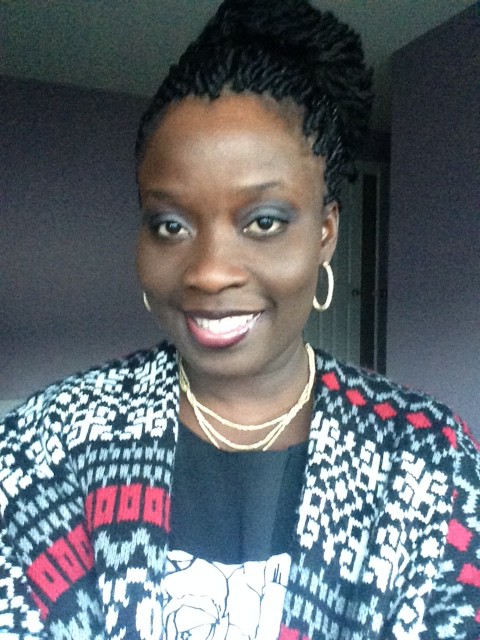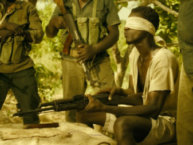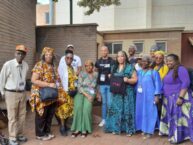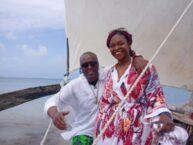 Originally from Ghana, West Africa, Ewurama Hayford has nurtured her love for African literature and creative writing from childhood, penning her first story at the age of 14. When she is not writing, Ewurama enjoys photography and cooking.She shares a home in Vernon, CT with her husband Isaac and their children, Roman and Zara.
Originally from Ghana, West Africa, Ewurama Hayford has nurtured her love for African literature and creative writing from childhood, penning her first story at the age of 14. When she is not writing, Ewurama enjoys photography and cooking.She shares a home in Vernon, CT with her husband Isaac and their children, Roman and Zara.
Surely, one’s ingress into the spirit world certainly merited more pomp than the elegance that a worn out velour jogging suit, and scuffed tennis shoes lent to the occasion. In her defense, the ancestors neglected to apprise Gladys of this minor detail when she walked out of the apartment for the last time that morning; hence her preoccupation with leaving home before her husband returned from his graveyard shift at the hospital.
It was snowing. Grey, slushy needles that turned to a slick veneer the second they hit the ground. 125th Street was cloaked in a dirty veil of sodden misery, and she sat in the midst of it, her bags spread out on the cold bench under the bus port that barely sheltered her from the driving snow.
Everything in Gladys’s life had deflated to an aging con artist for a husband, and her memories. The husband, she was leaving. The memories, they had been tucked away like precious old photographs in a peeling album, nestled in the farthest corner of her heart. On the days she felt herself rimming the margin of insanity, she would reach back, and retrieve a memoir, caressing its sepia tones.
She had learned to drift off on a single snapshot. Another memory.
Like this one here. If you could peer over her shoulder, you would see what she saw. It was her, Mama and Sister; lined up in front of the little blue shack they tended, with Sister’s food cart to the side. Mama looked proud and embarrassed, wearing the yellow “I Love New York” t-shirt and baseball cap Gyan had brought them. Sister’s face was folded in a scowl, her jealousy for her sister and her shiny new American life apparent. Gladys hardly recognized herself, she was smiling so hard she looked like her face would split, proudly clutching the Walmart bag full of cheap t-shirts and underwear he had gifted her. Mama had pulled her to the side and whispered in urgent tones.
– Ye se oye dokta. Aburokyire dokta. They say he is doctor. A doctor from America, who wants to marry you. His family, they are all big, important people. Not like us. Mama’s eyes shone with hope.
She hesitated.
– Wo’n pe’se wo be ye yie? ! Dokta honka fo paa! Don’t you want better for yourself, Gladys? A doctor’s wife! Be better than your old mother.
Gladys did not know what to say. Her heart was full of expectation, yet she tussled with apprehension. She was thirty years old already, and tired of selling small packets of garri, Nido and Ovaltine to lorry drivers and hungry travelers. Weary of waking up to the sour smell of Sister’s hot pepper, fried herring and kenkey; helping her hoist her steaming basin atop her head,watching her crooked little sway back figure head determinedly down the red dusty road towards the train station. Gladys didn’t like the look of this man she had been promised to. Straight from America, she had been told. A respected doctor in the city of New York. In her daydreams, Gladys’ betrothed was a striking man, built big and solid like an odum tree. His skin was brown as a bean cake, and he reminded her of stylish American doctors she had seen on television, who spoke in soft tones and smiled gently with white, gleaming teeth.
Gyan was nothing like she fancied. His clothes fit poorly on his bloated frame – the garish colors and gold chains he favored looked like they would crumble like moldy bread if you squeezed them too hard. When he laughed it was loud and self important, as though he needed to reassure himself that his loud clothes and choppy American accent made him better than everyone else.
She married him.
You see this photograph here? How could she was in this picture! She looks confused in this one because she was. Confused and exhausted, shivering in the oversize plaid shirt Gyan had wrapped her in at the airport, here red “Ghana Must Go” bag in hand. She and Gyan, standing in line, waiting to board the bus. She was certain he told Mama he had a Benz. A big beautiful house . A house surrounded by something he called “a-whypickimfens”. It was something that most Americans wanted, but only he had managed to get to grace their big home. Why then, she wondered, were they pulling up in front of a grey building that reached right up into the sky. Was that a rat that darted out in front of her?
- Krom ha ye din! M’eduma no nti, ma ye yie paa! Life in this country is tough, but because of my career, I’m doing very well. He laughed again, that self important chuckle.
This is a happy picture! You may not think so because she looks like she is crying, but they are tears of joy. Her face and belly are round and full as her heart, because now she has a reason to live, a reason to forget her pain and her fraud of a husband, because she is going to have a baby. What joy!
See, this picture here. This is brought back a painful memory! Look at all the unhappy colors – sticky swirls of cloying red, redder than the dusty village roads she traipsed a thousand times. And that was her in the corner, a stained lump on the shiny floor between the walls of canned tomatoes and tuna fish. Gladys felt foolish because she was dirtying these nice White peoples’ store; foolish because she felt small and lonely and African on that white, shiny floor, now soiled with her blood. Hands clasped between her thighs, she tried to push back the warm, sticky ooze; begging it to rush back into her belly and nourish the only thing that gave her life.
– Me ba, tsena! Engya wo maame h) saa! Stay, little one! Don’t leave your mother like this!
When she opened her eyes again, she was in a car, with soft, gentle hands touching her hands, her brow. Strong hands. A skinny tube with something that looked like water was running into her arm. The face that looked down at her was a smiling woman, pretty and brown skinned.
–My name is Gradis. G-L-A-D-Y-S.
The woman smiled and nodded, saying something. Her English was fast and sing-song and the rushing in her ears drowned out the words. Gladys closed her eyes. They felt hot and dry, like rough balls of tumbleweed stuffed in her sockets. She needed them to take her to Gyan. At least he was a doctor. He would know how to save her baby – their baby.
– My hasban is dokta. Keens…countee. He is dokta.
Faces. Sounds. Smells. They faded in and out, taunting her sense of reality; wildly swirling till she succumbed to its bewildering embrace, allowing her fevered, worn mind to be carried off into oblivion.
When she woke up, she was in heaven. An unruffled paradise that smelt of rubbing alcohol and soap, with a small television hanging from the wall, and yet another one to her side, with green, jagged lines snaking across its black screen. She sat up, and her hands went to her belly, remembering. For the first time, she was thankful she married Gyan. He would know exactly what to do. A sound broke through her reverie and her eyes were drawn through the open door to the hallway. Gyan! She sat up, relief pushing grateful tears to her eyes.
Something was amiss.
He was not wearing the white coat he insisted on being washed, starched and pressed every morning.
–I have to look as good as the other doctors, maybe better. They are already jealous of me because I am smarter than them.
Then he would puff out his chest, strutting like a rooster in heat.
He was pushing a cart, cluttered with bedpans, and bottles of soap and bleach – the kind he brought home from work, and made her use to scrub their floors.
He was not speaking. He was not using the big English words he used on the phone when he spoke to the Africans who called him for advice. Kom…sul…tayshin- that’s what he called it. Telling them they had illnesses like ‘ presha’ and ‘diebitis’. Words that made her feel stupid in her own home, because her English would never be that good.
He was at the door, marking a sodden path into the room with the dripping mop he pushed.
–Gyan!? Her voice was a questioning gasp.
He froze.
–Gyan! She wanted him to look at her, speak to her, say something. No one could be this base, this low.
Their eyes met. Locked. His bloated figure was motionless, framed by his mop and cleaning cart; emblems of every lie he had fed her.
For an instant, just an instant, his face crumbled.
–Na wo’n kasa? Won’t you say something?.
He looked at her. Then through her. Not a word. Then, he turned around, scouring the floor in soapy little circles, his cart trailing behind him,
Ahh, here is another sad one. Why were all her pictures so sad? In this one, they were at Kings County Hospital, right after the doctor told her that her baby died inside her. He called it something like ‘miscamage’. She felt cold and confused in that scratchy blue hospital gown, and she was trying to keep the hot tears in her heart from climbing up to her eyes and incinerating the dregs of her pathetic life. Gyan is grinning like the imbecile that she now knew he was, staring at the little television with green squiggly lines, as though he knew what they meant. Shaking the doctor’s hand, pumping it over and over again, saying “Tenk you, tenk you, tenk you.” Kwasea! Fool!
He said nothing to her. They sat side by side on the subway. Gyan read a newspaper, and she stared woodenly outside the window, clutching the bag of her blood stained clothes; watching the city speed by in a haze of lights, graffiti and asphalt. Before they got to their stop he patted her hand clumsily. Cleared his throat.
–Edwuma ne ye din! This job is so hard. Many sick patients. These Americans, they can be so demanding. Doctor, I want this; Doctor, I want that.
Gladys kept staring out of the window, watching the lights dance by, allowing his voice to blend into the distance.
The plan was to catch the Number 6 bus to Grand Central Station. From there she would fling the dice, and take then next train to wherever fate decided would be her next home. When Gladys stepped off the curb, she did not notice the patch of black ice as she ran to meet the approaching bus. She taxied off the pavement, and went airborne for a split second before crashing into the asphalt and sliding under the bus just as it rolled up. Her slight frame crumpled under the weight of the massive tires, but she did not feel the wheels crush her sternum. She did not gag when warm, salty blood flooded her throat, rose to her mouth, and bubbled through her nose. She was soaring. Like an angel. Ahh, look, there was Mama and Sister, mere specks in the vast space beneath her. Gladys waved, blowing them kisses. It was too late to go to them now, but they would come to her – someday. She rose high above her pain, beyond Gyan, and her sad American life. She spotted her little baby pirouretting in the clouds – her sweet baby lips calling her name- Mama, Mama! In one weightless leap, Gladys leapt forward and caught her precious child in her arms. They soared high, dancing, twirling and laughing, light and free.
Even when they led Gyan out of the room where she was laid, her crumpled frame body barely a lump under the white sheet, he could not stop shaking. He was so cold. They swept him into a quiet alcove, decorated in soothing blues, muted creams, as if the serene atmosphere was meant to muffle his pain. Gyan thought that the grief counselor’s eyes were as green as fresh stalk of corn, ready to be plucked. She stood up when he walked in, her hands outstretched.
- We are so sorry for your loss, Mr. Gyan. Is there anyone we can call for you? Family or friends close by?
In spite of his pain, Gyan felt a familiar glow, his puny ego buttered by the attention, the warmth of her kindness.
- I am ok! God knows best! He drew in deep breath, trying to calm himself. If only I could inform my family in Ghana….
- Please, please, call anyone, wherever you need to call. Take as much time as you can.
She clasped his hands after pushing the cordless phone towards him, squeezing the sympathetically before slipping out of the room.
Gyan’s fingers shook and fumbled as he found the numbers on the keypad. Tell the truth, he urged himself. Just speak the truth. The line crackled, then rang. Twice. Three times. His eyes stung with tears that he refused to shed.
- Mama nie? Is this Mama?
- Ei! M’emba! Mo ho te sen? Na me nana ne su? How are you, my children? How is my grandchild? Mama’s voice rose with pleasure.
- Mama, we are well. Yesu adom! All by the Grace of God. His saliva pooled in his mouth as bitter as chloroquine.
- Ma me ne me ba n’en kasa kakra, wai! Let me talk to my daughter.
Gyan never set out to be this kind of man- this morally sullied person. Somewhere along the line though, the mismatch between his desire to impress and his true abilities exploded beyond his control. Now, lying had become his lingua franca and like any native speaker, when he was strapped for words and explanation, he reverted to his mother tongue.
Ei, Mama, not now. We give all praise to God! Gladys is in the delivery room as we speak. The doctor says you will soon have a grandchild….
©2016 ewurama afadziwa hayford





